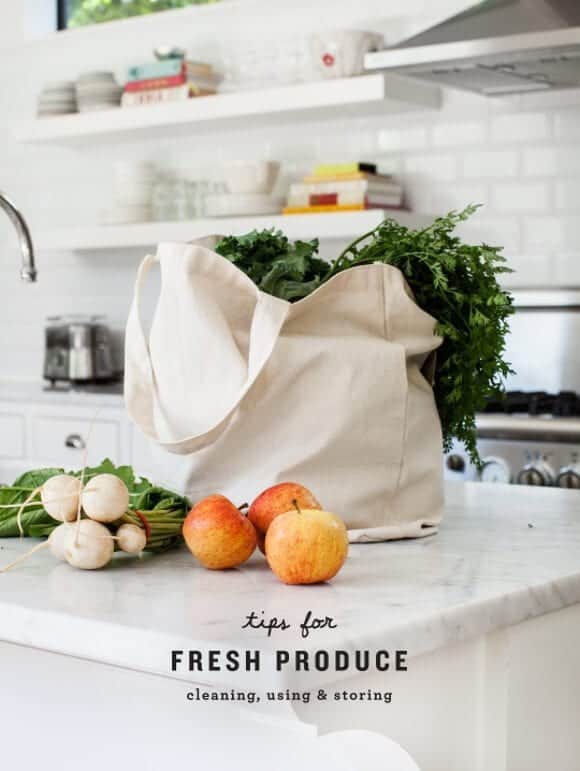
Once or twice a week, I get a huge bounty of fresh produce. My Farmhouse box arrives every other Wednesday, and I shop my local farmers market on Saturdays. Over the years I’ve learned a few strategies for cleaning, storing and using fruits and vegetables to make sure everything lasts throughout the week. I absolutely hate throwing food away. I know you do too, so I’m hoping you find this little guide helpful to avoid food-waste for yourself.
We’ve partnered with McCormick to share these tips as well as a few easy ideas to whip up farm-fresh dishes using their Gourmet dried herbs & spices.

CLEANING TIPS:
1. Wash fresh fruits and vegetables (except mushrooms) in cold running water. Clean mushrooms with a damp cloth to gently remove the dirt.
2. I like to wash leafy greens in a large bowl so any dirt can fall to the bottom.
3. Dry salad leaves in a spinner or just lay them on a towel for 20 or so minutes.
4. Scrub root veggies (sweet potatoes, carrots, etc.) with a brush to remove dirt. Or just rinse & peel, but I like to preserve the nutrients by leaving skins on.
5. Except for leafy salad greens, fruits and vegetables should be washed just before you’re ready to use it, (i.e. not days in advance).

STORAGE TIPS:
1. Certain vegetables (and fruits) contain a gas called ethylene. Ethylene triggers the ripening process and will deteriorate some veggies faster. My #1 storage tip is to make sure you store ethylene-producing vegetables separate from ethylene-sensitive vegetables.
ethylene-producing produce: apricots, avocados, bananas, cantaloupe, melons, mango, peaches, pears, tomatoes.
ethylene-sensitive produce: apples, asparagus, broccoli, carrots, cucumbers, eggplants, green beans, leafy greens, potatoes, summer squash.
2. Store veggies un-cut to last the longest. Cut produce should be tightly covered and used within 1-2 days.
3. Below are a few storage suggestions. This is just a rule of thumb – your vegetables may last longer or shorter depending on when (and where) they were picked and when you took them home.


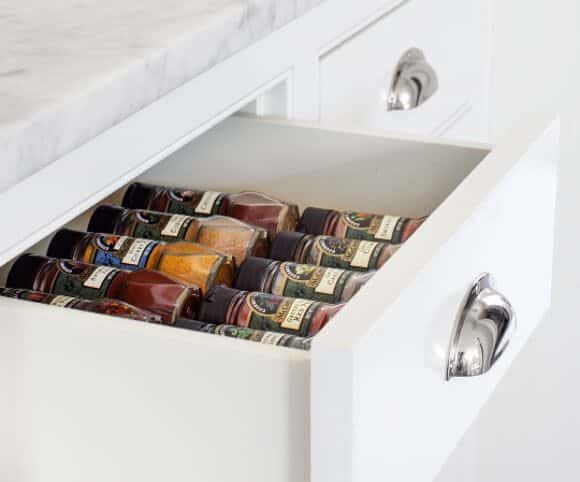
USING FRESH PRODUCE:
At the start of the week (with the freshest fruits & veggies):
I always use up my most fragile produce first. Early in the week I make salads from crisp lettuces, cucumbers, peppers, and lightly roasted summer or winter squash. I start the week off with lightly cooked meals while produce is at peak freshness. For example:
Salads with chili-lime dressing: whisk olive oil, lime, honey, and chili powder.
Sliced veggie plates with hummus: blend chickpeas with olive oil, lemon, garlic, salt, pepper, cumin & coriander.
Simple pasta: lightly sauté summer squash with basil, oregano & parmesan.
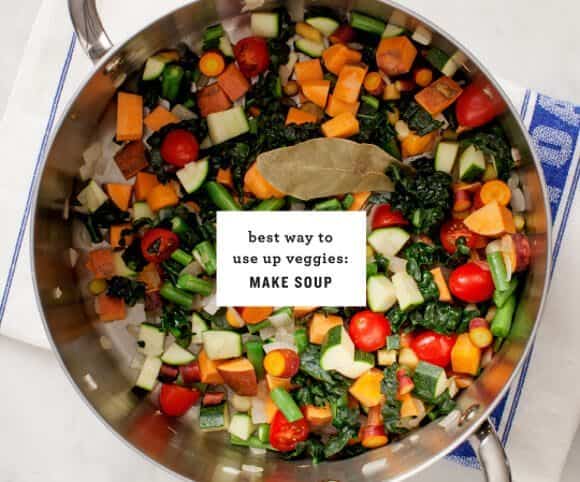
Toward the end of the week (with any veggies that are left):
I usually end up with a random assortment of (lightly wilted) veggies to use up. I often make frittatas or stir fries but, especially now that it’s fall, my favorite go-to meal is soup. Chop everything up and toss it in a big soup pot with olive oil, salt & pepper. Cook veggies until lightly browned, add a splash of white wine (or white wine vinegar) and let it cook out (2-3 minutes). Add vegetable broth and simmer until all veggies are cooked through. Create different flavor profiles by changing just a few spices and pantry items:
Mediterranean: add crushed red pepper, bay leaves, oregano & a can of tomatoes. (Click for the full recipe).
Mexican/southwestern: add coriander, chili powder, cumin & black beans for a soup that’s similar to this vegetarian chili.
Indian: add madras curry, turmeric, cayenne & a can of coconut milk for a creamy curried soup similar to this one.
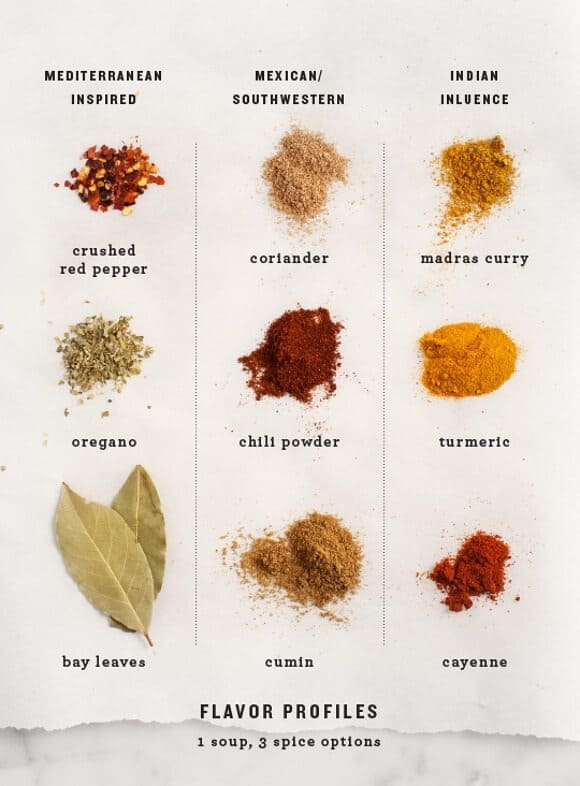
This post is sponsored by McCormick. All thoughts, words and images are my own. Thank you for supporting the sponsors that support Love and Lemons.








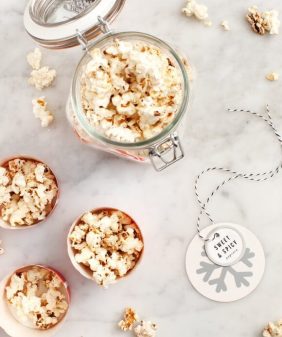


Such a useful article! This year I’ve decided to freeze some of my home-grown fresh vegetables instead of buying cans or already freezed from the store, so this post will come in handy. Thanks for sharing!
Thank you!
What camera did you use for these pictures? They are great! I’m looking for a new camera and I will be very happy if you answer me 🙂
thanks 🙂 We use a Canon 5d Mark 2
This article is lovely. With all these beautiful pictures and everything so clean. I can almost smell vegetables while reading it <3
I’ve never had enough vegetables that I needed to store them, but I’m really trying to work on my food storage these days. That little earth quake in California a few weeks ago made me think about my emergency preparedness. I’d like to eventually have a good-sized food storage in its own room.
This site is fantastic. Thanks for all the tips and the great vibe i got from your fine pictures.
So interesting article! I eat a lot of vegetables just because I have a garden at the back of my yard. I love the part with the cleaning because sometimes we forget how important is to clean the production properly. Thanks a lot! Charlton Carpet Cleaners Ltd.
Your diagrams are great! I’m going to print, frame and hang them on my kitchen wall!
I put my kale in a plastic grocery bag and spritz it down with water, then just tie the bag shut. My kale stays good for up to, and sometimes past, a week. I learned it off some you tube video on raw food. Works great!!!!
You have some amazing recipes, have you got any good recipes you have done with fresh truffles? I have bought some from here http://www.trufflehunter.co.uk
Loved the tips just retired and doing more experimental menus. Your tips were extraordinarily helpful. Trying to work them into a grid for everyday reference
The “green bags” by Debbie really do work for keeping veggies fresh longer. I also learned a trick recently for celery which is to wrap it in aluminum foil before you put it in the fridge. It really works! I was so tired of throwing out celery all the time.
I love all these little diagrams. Thanks for sharing 🙂
Im not sure why these showed up so many times. Sorry about that!
no worries! Hope you enjoy the soups!
I love this post. It is extremely informative, and I love the variance in tips. I always struggle with having certain produce go bad because I buy too much or use the wrong things first. I am very excited to try your seasonings for different kinds of soups! Thanks! I
Love this little cheat sheet! So smart to plan to use your fragile veggies first too, how have I never thought of that? We freeze all sorts of fruits and veggies and throw the frozen fruit in overnight oats and smoothies and the veggies into eggs and fritatas on the weekends. I’m always glad we saved them that weekend when I enjoy my eggs!
Thank you so much for all these useful tips!
Great tips!
Love the photos and the soup spice mix is great!
Excellent – love how you broke out how to “use up” – though, you might consider that we don’t all have tons of veggies left each week. An easy way to handle this, is to chop up/throw veggies into a big freezer bag and keep it in the freezer. Once it is full, you have the base for either a terrific veggie broth for cooking , or a soup.
Hi Ariel – you’re absolutely right – I actually do that too. I use the leftover (collected) frozen veggies in frittatas and leftover frozen greens for pesto.